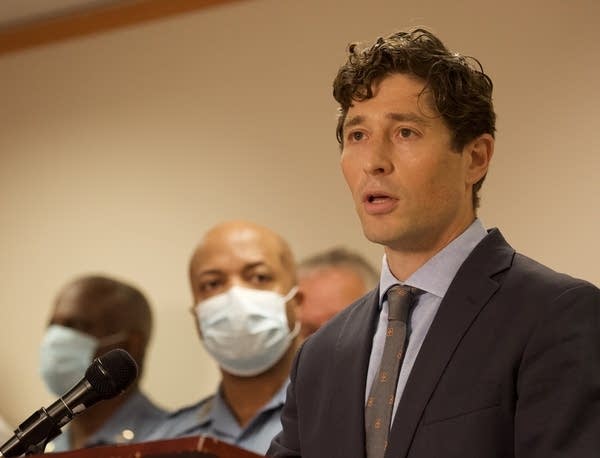Minneapolis announces changes to police misconduct investigations

Go Deeper.
Create an account or log in to save stories.
Like this?
Thanks for liking this story! We have added it to a list of your favorite stories.
The city of Minneapolis is beefing up its investigations into allegations of police misconduct in an effort to ensure that officers who are fired by the department don’t get their jobs back.
Mayor Jacob Frey announced Tuesday afternoon that city attorneys will now be involved in every part of investigations into complaints about officer behavior.
“We are marking another very important step in our broader commitment to creating a more fair, a more just and accountable police department,” Frey said.
City attorneys will work with internal affairs and the Office of Police Conduct Review to look at evidence and interviews, helping to decide if more investigation is legally warranted. They’ll also consult with the chief when he’s deciding on whether to issue discipline. In the past, city attorneys were usually just consulted after an officer’s punishment was appealed.
Turn Up Your Support
MPR News helps you turn down the noise and build shared understanding. Turn up your support for this public resource and keep trusted journalism accessible to all.
Assistant City Attorney Tracey Fussy said her office has decades of experience in litigating cases of police misconduct.
“We’re definitely in an absolutely unique position from the gate in understanding the law, understanding why officers need to do what they need to do in certain situations, and why in other situations, the behavior was not warranted,” Fussy said.
An MPR News investigation this summer found that about half of fired Minnesota police officers get their jobs back through the state arbitration system.
Frey said the city's change is intended to ensure that justified firings of officers stick. More than 50 percent of all disciplinary cases are either reduced or overturned, with arbitrators typically citing due process concerns such as faulty investigation. The mayor called that ”unacceptable.”
“Our communities, especially our communities of color, have too often paid the price for internal shortcomings,” Frey said. “We, as a city, cannot allow a file languishing on an overworked investigator’s desk to boost the odds of a bad cop being put back on the street.”
City Police Chief Medaria Arradondo welcomed the change. He said investigations should be as thorough as possible for the benefit of both the person who filed the complaint and the officers involved.
"Good peace officers do not want bad officers on the MPD,” Arradondo said. “They tarnish the badge, they forsake our oath of office, and they destroy the great and important work that so many of our men and women do each and every day in service to our communities."
Some changes are already being implemented, and city officials expect the whole plan to be rolled out in the coming months. But some activists say they don't go far enough.
Michelle Gross, of Communities United Against Police Brutality, was skeptical that the newest change would make much difference. She suggested the city’s need to minimize exposure to civil litigation over an officer’s actions would be a strong disincentive to the city attorney’s office in investing an allegation of misconduct.
“A lot’s going to depend on whether they can figure out their conflicting roles,” she said.
City officials did not immediately respond to questions about Gross’ statements.
Minneapolis police have come under heavy pressure to reform since the killing of George Floyd in May.
Critics said Floyd’s death was just one more instance of brutality in a department long unable to change its culture. Activists have attacked a system that rarely disciplines problem officers. Chauvin had 17 complaints against him and had been disciplined only once.
In a statement, the Police Officers Federation of Minneapolis said it backed the changes but blasted city leadership:
“With historically high crime occurring in Minneapolis, it’s a shame that the priorities of city leaders are so out of focus. The Federation welcomes the changes they make in their investigative process. We appreciate thorough fact finding. We just wish the chief would discuss these things directly with us, rather than finding out from the press. He has skipped labor/management meetings most of the year.”
The city is in the midst of negotiating a new contract with the union. Arradondo announced in June that the city was pausing negotiations for a review of ways the deal could be restructured to give more flexibility, including on how discipline is handled.
Frey declined Tuesday to give an update on where those negotiations stand. The city this month announced an agreement with an outside law firm, Jones Day, for free assistance that could include involvement in the negotiations.


